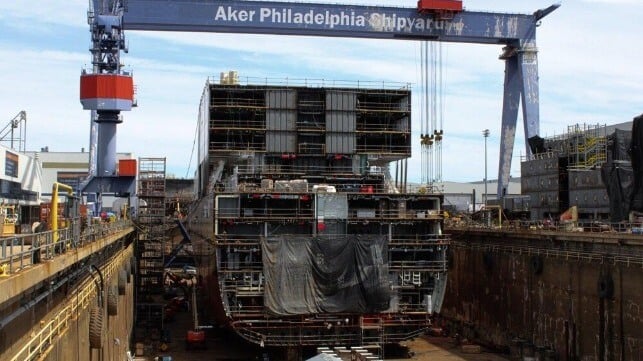Hanwha Agrees to Pay $100M to Acquire Philly Shipyard

South Korea’s Hanwha Group announced a deal to acquire Philly Shipyards, an operation focused on building Jones Act vessels, from the yard’s Norwegian owners Aker Capital. The negotiations had first been reported in October 2023 as the South Korean company looks to expand its foothold in the U.S. market and naval and government shipbuilding.
Philly Shipyard traces its originals to the late 1990s when the U.S. Navy's Philadelphia Shipyard was closing and the government drydocks were leased to Norway’s Kvaerner Shipbuilding. Plans were announced for the yard in 1997 and they began building the first containerships in 2000. Since then, most of the yard’s work has been in the commercial sector building containerships and tankers for companies including Matson, Crowley, OSG, SeaRiver, and Kinder Morgan as well as a few U.S. government repair jobs. Since 2000, they noted that Philly Shipyard has delivered approximately half of all the new large ocean-going Jones Act commercial ships.
Recently, the yard won the contract to build five new training ships for MARAD, of which the first was delivered in 2023 and the second is approaching delivery while work progresses on the other three vessels. Philly also has construction underway on a rock installation vessel for Great Lakes Dredge and Dock Company and has a contract to build three LNG-fueled containerships for Matson. The total orderbook is valued at approximately $1.6 billion.
Under the terms of the agreement, Hanwha Systems and Hanwha Ocean will split the purchase paying a total of $100 million in cash for the shares of the company. Aker Capital (an investment company and the successor to Kvaerner) is the largest shareholder owning approximately 60 percent of the stock. They expect the transaction to close in the fourth quarter of 2024 subject to regulatory approvals including the Committee of Foreign Investments in the U.S. (CFIUS).
"The opportunity to collaborate with Philly Shipyard, a significant shipbuilder with a storied history, is an exciting strategic opportunity that will allow Hanwha Systems to deploy its state-of-the-art naval systems and associated technologies in the U.S. market," said CEO of Hanwha Systems, Charlie SC EOH.
Aker highlights it realized $150 million in dividends from Philly in the past decade in addition to the $100 million purchase price to be paid by Hanwha. The purchase price however could be adjusted if the shipyard has more than $100 million in cost overruns on its current projects. The shipyard had previously reported that it expected to record a loss on the training ships for MARAD.
The shipyard has a history of working with the Koreans including designs and components from the former Daewoo Shipbuilding and Marine Engineering (DSME) which was acquired by Hanwha to become Hanwha Ocean. Hanwha and Aker have also been involved in previous business transactions including the 2022 acquisition of Arker’s stake in Rec Silicon, a silicon manufacturer for commercial applications, by Hanwha.
Philly Shipyard had also drawn the attention of Hanwha’s rival HD Hyundai. In April, HD Heavy Industries signed an MoU with Philly Shipyard to form a new partnership targeting U.S. government work and cooperation. Between 2005 and 2017, Hyundai supported the design and procurement for 22 commercial product tankers built by Philly. There was no mention of this agreement in today’s acquisition announcement.

that matters most
Get the latest maritime news delivered to your inbox daily.
Hanwha and Philly said their boards would work on defining the company’s future strategy and structure following the completion of the transaction.
This deal comes after Hanwha also proposed an acquisition of Australia-based Austal, a major naval builder in the U.S. That transaction is caught up with regulatory concerns, but Hanwha has said it is still interested in exploring the combination. The company’s proposal for a due diligence to formalize its offer was rejected by Austal which said it was not certain a deal could be completed due to national security considerations in Australia.
